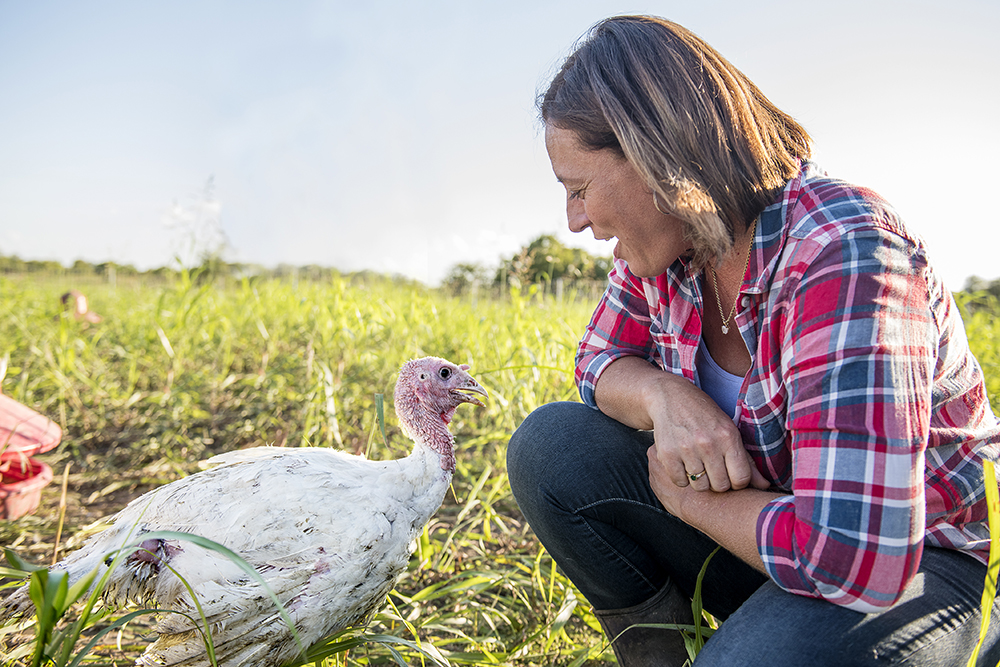Small farmers have a huge impact on our food—2 billion small farmers produce 70% of the world’s food. So, how can we help support them on a local level? We have suggestions ahead.
In the latest episode of Your Food’s Roots with Zooey Deschanel, we cover the challenges that small farmers face as they grow the food that we enjoy. According to Greenpeace, more than 2 billion small farmers produce 70% of the food we eat, so small farmers play a pivotal role in our food system. So, why is it that so many of us don’t know who our local farmers are, or what it takes for food to get to our plate?
If you’re like us and are wondering how to support local, small farmers, we have suggestions ahead. These tips will not only make their lives better, but they will also help you eat delicious, seasonal food that’s good for you and the environment!
Why is it important to support small farmers?
There are numerous benefits to supporting our local small farmers, and perhaps the most selfish one is that we can enjoy foods that are fresh, have traveled minimal food miles, and taste delicious. In America, our food travels an average of 1,494 miles to get from the farm to our plates, according to a study conducted by the Leopold Center for Sustainable Agriculture. You may not know exactly how many food miles your foods have travelled, but you can taste the difference when eating foods that are freshly harvested and come from a local farm.
Small farmers are better able to employ sustainable farming practices such as running an aquaponic farm (e.g. Agua Dulce), or employing regenerative farming practices ( e.g. Pocono Organics ) because they can optimize for quality product that meets the expectations of specific buyers. While there are always exceptions to the rule, small farmers have more limitations when it comes to resources, so they’re incentivized by benefits such as lower water usage or using nutrients from natural sources (such as waste from fish or other animals on the farm), resulting in sustainable farming practices.

How can you support small farmers?
You can support small farmers by voting with your food dollars; the more you activate your local food economy, the stronger it will grow! The following are a few ways you can vote with your food dollars:
Subscribe to a farm-direct grocery provider
A distributor such as Farmhouse Delivery, based out of Austin, TX, is an example of a farm-direct grocery provider. Each farm-direct grocery provider will have their own way of running their operations, but the goal is to help both farmers and consumers.
For consumers, rather than pay upfront as they would for a CSA program, they pay once they receive their food, which is fresh, in-season, and delicious. They don’t need to vet the farmers and their farming practices, because Farmhouse Delivery does it for them. For farmers, a distribution service provider such as Farmhouse Delivery provide assurance that their food will have a buyer so they can grow their crops with confidence.
While there isn’t a database for farm-direct grocery providers, we suggest a quick online search using the terms ‘Farm Box near me.’ Also, most companies will show you which farms they’re sourcing their products on their website, so you can learn more about the farmers growing your food!
Subscribe to a CSA program
A CSA (Community Supported Agriculture) program gives farmers assurance in terms of predictable demand—depending on the number of consumers that subscribe, the farmers can already allocate their resources based on demand, and grow the crops that their community wants to eat.
Farm-direct grocery providers are similar to CSA programs, except for the fact that most farmers will want you to pay up-front before they start planting their crops for the season. This is important for small farmers because it allows them to allocate their resources strategically (seeds, labor, etc.). Consumers benefit because they receive super-fresh foods while supporting their local farmers.
To find a local CSA program near you, check out Local Harvest’s database.
Shop at your local farmers’ market
There’s no easier place to get to meet your farmer and learn about their farming practices than your local farmers’ market. When shopping, you can ask the following questions to learn more about your farmer:
Where is your farm? How far has this food traveled?
What’s in season right now?
What kind of sustainable farming practices do you implement?
Do you spray? How do you deal with pests?
What kind of nutrients do you use to feed your plants?
What are your growing right now? (Then you’ll know what to look forward to in a few weeks.)
Of course, it helps to start a friendly conversation with your farmer first, and get to know them better! Remember to look beyond the organic label—some farmers have incredibly sustainable farming practices, and can’t afford to the organic certification. To find your local farmers’ market, check out Local Harvest.
Shop at your local co-op
A co-op is a retail store, much like an ordinary grocery store, except that its owners are the customers that shop there. What this does is puts the power of food dollars back in their hands, so the collective can support farmers whose values and goals are in alignment with the community’s.
When shopping at a co-op, you have the opportunity to ask questions about where your food comes from, who grew it, and how they grew it. Lastly, most co-op members usually get a discount on their grocery once they join, but you can still shop at a co-op without a membership. To find a co-op near you, check out Stronger Together.

After watching this episode of Your Food’s Roots with Zooey Deschanel, you’ll likely have a greater appreciation for how much work it takes to grow food. Small farmers are the backbone of how we can create a better food system, increase biodiversity, and create stronger communities. We know that eating healthy foods can be a more costly option, which is why it’s important for us to vote with our food dollars, because an increase in demand means lower prices for all. Let’s all make it a point to support our local farmers, whether it’s shopping at a farmers’ market, a co-op, or subscribing to a farm-direct grocery service or CSA program! We can do this!
Read Next


